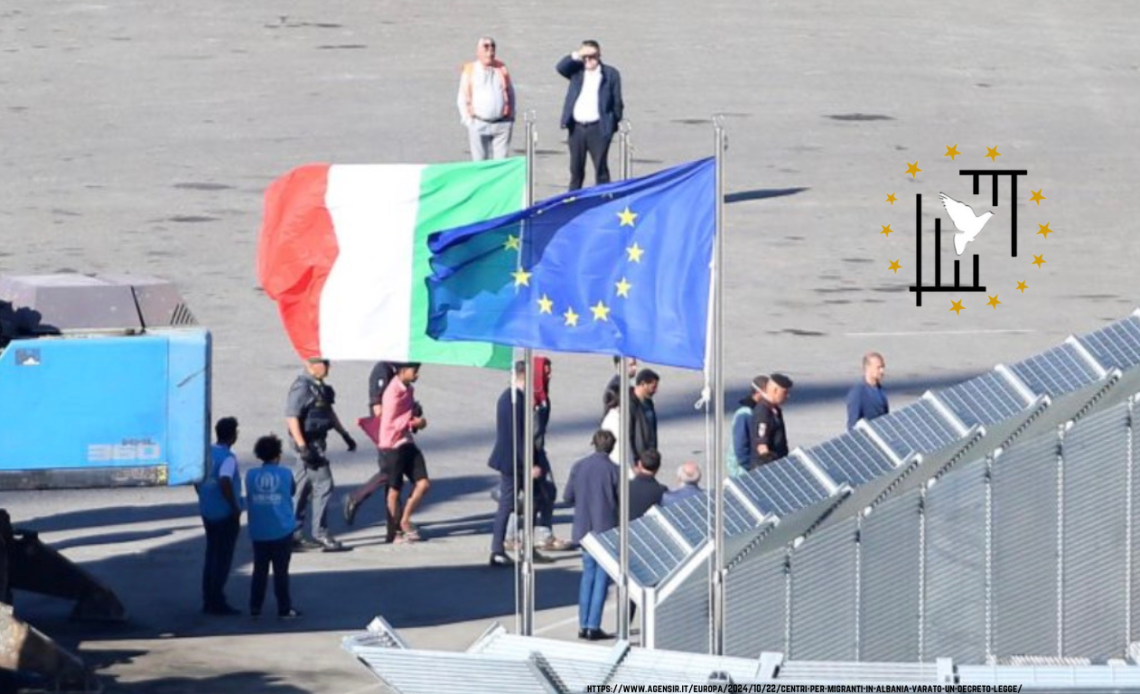What is the Italy-Albania Protocol?
On November 6, 2023, Italy and Albania signed the “Protocol between the Government of the Italian Republic and the Council of Ministers of the Republic of Albania for Strengthening Cooperation on Migration” in Rome. This agreement allows Italy to process asylum applications from certain categories of migrants in Albanian territory, specifically in Shëngjin and Gjadër, but under Italian jurisdiction. It also allows deportation procedures to be carried out in these locations. The law was published in the Gazzetta Ufficiale on February 22, 2024 under Law no. 14/24 and officially came into effect on February 23. On the same day, the Albanian Parliament ratified the agreement, concluding the ratification process. However, from the start, concerns were raised about potential violations of migrants’ fundamental rights due to the procedures outlined in the protocol. Dunja Mijatovic, the then Human Rights Commissioner for the Council of Europe, warned that “the lack of legal certainty will undermine crucial human rights safeguards and accountability for violations.” She further highlighted the risk of differential and discriminatory treatment between asylum seekers processed in Italy and those transferred to Albania.

What is happening in Italy?
On October 16, after two days at sea and over 500 nautical miles, the Italian Navy vessel Libra completed the inaugural voyage of the transfer and detention mechanism for asylum seekers provided for by the Protocol, transporting 16 migrants, including 10 Bangladeshis and 6 Egyptians, from Lampedusa to the Albanian port of Shëngjin. However, the Rome Tribunal’s Human Rights and Immigration Section did not validate the detention of the migrants at the Italian repatriation center in Gjadër, Albania. Essentially, it was decided that the migrants must be returned to Italy. The Italian judges explained that they refused to validate the detentions in Albanian facilities because the migrants’ home countries cannot be considered safe. This makes the border procedure inapplicable, and according to the Protocol, prevents the transfer of migrants outside Albania. As a result, the migrants must be brought back to Italy.
At this point, it is important to clarify what “Safe Country” means: the concept of a “Safe Country” is defined in Article 37 of Directive 2013/32/EU, which states that a country can be considered safe if, within a democratic system, it does not generally present a risk of persecution, torture, inhuman treatment, or danger from indiscriminate violence in armed conflicts. The European Court of Justice (ECJ), in its ruling C-406/22 on October 4, 2024, emphasized that a country can only be deemed safe if safety is ensured uniformly across its entire territory. This ruling formed the basis for the Rome Tribunal’s decision to reject the detention of migrants in Albania.
With regard to Italy’s national legislative framework, Italian law (Article 2-bis, paragraph 2 of Legislative Decree No. 25 of 2008) allows for a country to be designated as “safe” with exceptions for certain regions or groups. Moreover, according to the Italian Ministry of Foreign Affairs decree issued on May 7, the list of safe countries includes 22 states, 15 of which are designated safe with exceptions for certain areas or groups. Therefore, Italian law does not align with the ECJ’s judicial interpretation.

How did the Italian government respond?
Prime Minister Giorgia Meloni quickly responded, calling the Rome Tribunal’s decision “prejudicial” and expressing frustration at how some institutions, which should be supportive, instead obstruct the government’s work. “The judiciary should apply the law, not change it or prevent the executive from doing its job,” “we will move forward with what European Commission President Ursula von der Leyen said, that the Italy-Albania agreement is a model to follow.”: these are the words of the Foreign Minister Antonio Tajani.
In practical terms, this conflict resulted in the preparation of a decree-law introducing “Urgent Provisions on International Procedures,” as noted in press release no. 101 of the Council of Ministers. The new law updates the list of safe countries, officially recognizing Bangladesh and Egypt as safe across their entire territories. Under this new law, the list of countries where refugees can be repatriated is now established by primary legislation, rather than by ministerial decree, as was previously the case. Italy’s Interior Minister, Matteo Piantedosi, argued that the Rome Tribunal can no longer overturn migrant transfers to Albania because the new list is part of primary legislation, which cannot be easily disregarded. Justice Minister Carlo Nordio agreed, stating that while a judge can disapply secondary legislation, they cannot disapply a primary law. However, this doesn’t resolve the deeper legal issue, as even primary laws can be overruled if they conflict with European law. Furthermore, the assessment of international protection must still be made on a case-by-case basis, with the judge determining why a particular country is not safe for a specific individual.
Final Considerations
The issue is still developing, and further clarity will come when the official text of the decree is published in the Gazzetta Ufficiale. Before the law takes effect, it must be signed by the President of the Republic Sergio Mattarella. Additionally, the Constitutional Court may be called to review the decree if the appropriate legal channels are followed.
All these controversies contribute to a growing climate of hostility towards migrants in Italy. This is evidenced by a recent report from the European Commission against Racism and Intolerance (ECRI), which expressed concern that “Italian public discourse has become increasingly xenophobic in recent years and that political rhetoric has taken on highly divisive and antagonistic tones, particularly against refugees, asylum seekers, and migrants, as well as Italian citizens with a migrant background.” The ECRI, that is a Conseil de l'Europe body, also condemned “undue criticism aimed at undermining the authority of individual judges who rule on migration cases,” when, in fact, the judiciary “should be respected, protected, and promoted.” And this is what we sincerely hope will happen, now and forever.
References
https://www.agensir.it/europa/2024/10/22/centri-per-migranti-in-albania-varato-un-decreto-legge
https://tg24.sky.it/cronaca/2024/10/18/tribunale-trattenimento-migranti-albania
https://lavialibera.it/it-schede-2019-albania_centri_migranti_accordo_cpr_meloni
https://eur-lex.europa.eu/legal-content/EN/TXT/HTML/?uri=CELEX:32013L0032
https://rm.coe.int/sixth-report-on-italy-translation-in-italian-/1680b205f7

